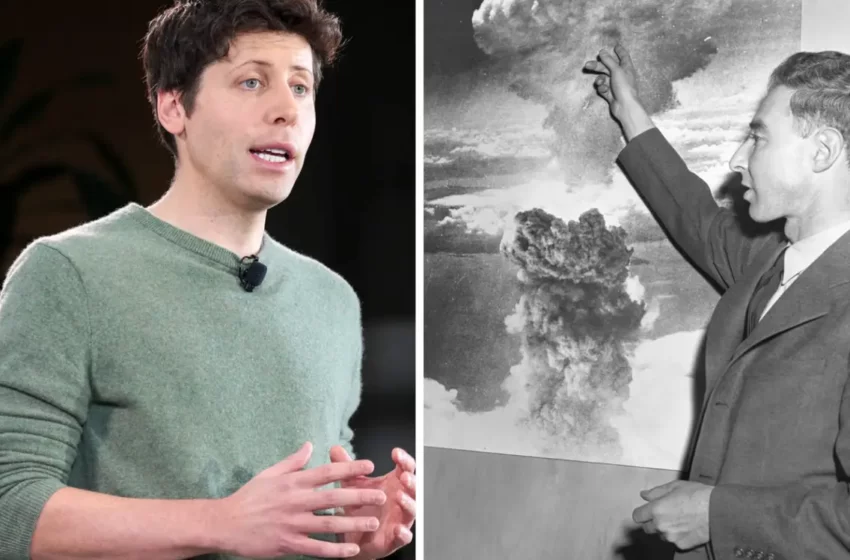
Sam Altman Is the Oppenheimer of Our Age
Sam Altman likened his plan for general AI to the Manhattan Project, which Robert Oppenheimer led to build the atomic bomb. It was a comparison that annoyed experts.
He spoke of the need to “bend the world to our will,” with a force of personality that matched his ambitions. He envisioned his first startup, Loopt, identifying people by scanning their eyeballs.
He’s a nerd
As a nerd, Altman’s childhood was filled with dreams of space travel. He and his brothers grew up sitting around the dinner table talking about spaceships, and their parents always encouraged them to learn more about math and science. This is what fueled his passion for technology and led to his early success. He began by tinkering with computers, and soon started to work on his own startup, which he named GPT3. GPT3 was the first version of what would become ChatGPT, an open-source chatbot that allows users to communicate with artificial intelligence.
After the success of GPT3, Altman created OpenAI, a non-profit company that is dedicated to advancing AI. He has often likened his plan to achieve general AI to the Manhattan Project, which Robert Oppenheimer led to build the atomic bomb.
The movie “Oppenheimer” resonated with many people, but it missed one key point for Altman: that it failed to inspire a generation of young people to pursue careers in physics. He hopes that his work will encourage a new generation to pursue scientific and technological advancements.
Throughout his life, Altman has been guided by a strong sense of morality and a desire to help people. This has been reflected in his work and his personal life. In addition to a deep commitment to his family, Altman has a number of hobbies and works hard to maintain a healthy lifestyle. He has a strict diet and practices intermittent fasting. In his free time, he enjoys flying his private plane or driving cars.
Altman’s philosophies have informed his decisions as CEO of OpenAI. He has been vocal about the need to create ethical AI and has argued for a regulatory body modeled after the International Atomic Energy Agency. He has also advocated for an end to military use of artificial intelligence.
Despite this, he has found it difficult to find funding for his moonshot projects. He says that the companies that were launched at Y Combinator, such as Helion Energy, which is working on fusion power, and Relativity, an orbital rocket company, have not been as successful as they could be. As a result, he has decided to launch a new fund that is explicitly dedicated to backing more moonshots.
He’s a tycoon
In addition to a stint as Reddit’s CEO, Altman founded Loopt, a location-sharing app, and ran tech accelerator Y Combinator. He’s a prolific investor, having early stakes in companies such as Airbnb and Stripe. Altman’s net worth is estimated at $800 million. He lives in a mansion on San Francisco’s Russian Hill. He’s also a prolific traveler, visiting countries like Japan, Germany, India, South Korea, and Israel. He follows a healthy lifestyle, including intermittent fasting and vegetarianism.
He’s also a philanthropist, spending much of his time helping young physicists. The New York Times describes him as a “tycoon of our age.” He has poured billions into various projects and has a reputation for being a power player with a vision for the future. But, he is not without his critics.
In particular, he has been criticized for his relationship with tech mogul Peter Thiel. Thiel is a Trump supporter and owns Palantir, a company that has access to sensitive data. He’s also invested in military technology. These relationships have led some to call him a shady character.
Altman is also a founder of Helion Energy, which is attempting to build nuclear-fusion reactors. If successful, these reactors would create more energy than they consume. They would be a major step forward for the world. Helion has raised more than $375 million, making it one of the most expensive fusion projects in history.
While the company’s fusion technology is still a long way off, Altman remains bullish on the future of fusion energy. He says that it will eventually be cheaper and cleaner than coal or natural gas. He also believes that fusion will be the basis of our new energy system.
While his work in AI has made him a household name, he is also part of a movement that worries about its risks to humanity. This group, which calls itself rationalists or effective altruists, is a driving force behind the creation of OpenAI. This group is concerned that artificial intelligence could lead to a global diaster and wants to prevent it from happening.
He’s a physicist
As the chief executive of OpenAI, Sam Altman has created technology that could answer a burning question about organic chemistry, write a 2,000-word term paper on Marcel Proust’s madeleine or drop digital snowflakes across a laptop screen with a skill that seems human. He is the embodiment of a group of people who worry that artificial intelligence will become so powerful and dangerous that it will destroy civilization. They call themselves rationalists or effective altruists. Altman’s obsession with the power of AI has made him a hero to them, and it has given him a platform to push back when critics accuse him of reckless behavior.
He has gestated a clutch of side projects that prepare him for an AI-transformed world. He invested $375 million in Helion Energy, a speculative nuclear-fusion company that may one day control the world’s cheapest energy source. He also helped create Retro Biosciences, which hopes to add ten years to the average life span. And he has raised $115 million for a project called Worldcoin, which scans people’s eyes to verify their identity.
Altman’s family relationships, particularly with his sister Annie, provide a more personal lens on his ambitions beyond AI. She has said that she feels “abusive” when she sees her brother spend so much time at work and ignores her. She says she used to feel special and loved when Sam read her bedtime stories, but now she thinks it’s like a form of abuse.
But she is also aware of the risks inherent in a world where artificial intelligence is rapidly becoming more powerful. She fears that the same McCarthy-like anti-China hysteria currently playing out in Washington could easily suck her brother into it.
In a rare public appearance this spring, Altman sat down with the Buddhist monk Jack Kornfield at Wisdom 2.0, an event that blends wisdom and technology. The conversation was low-stakes, and the two occupied huge white-upholstered chairs on a mandala-backed stage. Altman rarely grants interviews to mainstream media, preferring to explain himself through Twitter and meetings with Congress or wealthy investors. He also has a blog and writes for magazines that target narrow audiences.
He’s a philosopher
As the CEO of OpenAI, Sam Altman has been instrumental in advancing artificial intelligence. The work he has done has led to the creation of GPT3, GPT4, and ChatGPT, among others. His accomplishments have earned him comparisons to J. Robert Oppenheimer, who was the scientific director of the Manhattan Project. While this is a great honor, it also comes with a lot of responsibility. Altman’s approach to his work has sometimes been controversial. He has a tendency to focus on his own interests and ignore the needs of other people. This has led to a number of lawsuits against him.
Despite this, Sam has managed to turn the Open AI project into one of the world’s largest non-profit organizations. However, some critics have questioned whether it is ethical for a company with such a huge budget to make money from its product. Others have compared the situation to a nonprofit created to save an Amazon rain forest that then turns into a lumber business.
In addition to his work at OpenAI, Sam has founded several companies, including Loopt and Hydrazine Capital. He also served as president of Y Combinator, which has produced startups such as Airbnb and Reddit. He is not afraid to take risks and has even invested in nuclear energy.
While Sam is focused on the future, he has also expressed his concerns about social issues. He believes that emerging technologies can be used to solve these problems and improve people’s quality of life. He has often described the revolution he is leading as bigger than a typical technological revolution.
He has advocated for universal basic income (UBI), and he has been an outspoken critic of the Trump administration. He has also spoken about his concerns regarding climate change and inequality.
Despite these criticisms, Sam’s efforts have not gone unnoticed. He has received many awards and has been featured in a number of publications. In addition, he has spoken at prestigious universities and conferences. Moreover, he has written books on technology and ethics. He has also made several appearances on popular podcasts.







